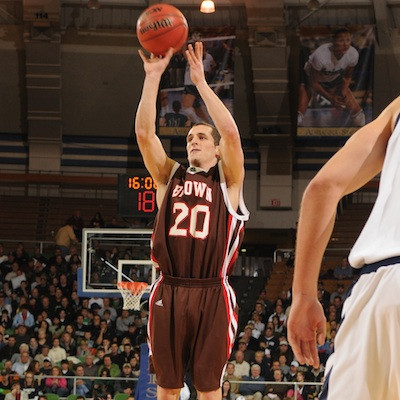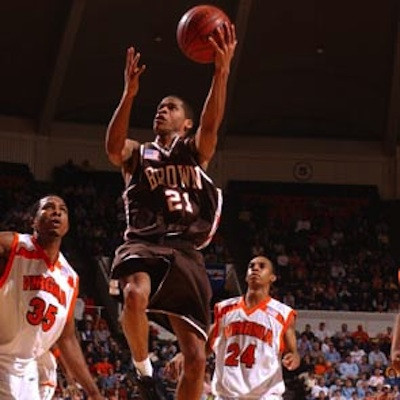Russell Moore: RI Interscholastic League Gouging Fans
Thursday, March 27, 2014
When run properly, there are probably few things better and more wholesome than youth sports, and in particular, high school sports.
Sports they teach youngsters about discipline, hard work, and sportsmanship—not to mention so many other values and lessons.
But what happens when sports are run in a way that teaches, either directly or indirectly—the wrong lessons? Unfortunately, the Rhode Island Interscholastic League (RIIL) has run its basketball state tournaments this year in a way that certainly opens them up to criticism. It seemed like the state basketball tournaments were run in a way that, first and foremost, sought to make money for the RIIL.
GET THE LATEST BREAKING NEWS HERE -- SIGN UP FOR GOLOCAL FREE DAILY EBLASTMisguided Priorities
Here’s the thing: it really rubbed me the wrong way when I noticed that the RIIL was running two basketball tournaments—as has been the case for a few years now. The state ran a 4 round tournament for every division, culminating in a final round with a champion.
But wait! There’s more. Once that tournament ends, the RIIL then puts on another “open” tournament, where the highest ranked teams from every single division face off in a 16 round tournament.
I really wanted to think that this was being done in order to give the kids more games and more experience playing sports. But I decided to look further into the situation—and I wasn’t exactly pleased with what I’ve found. Basically, it cost parents and student fans quite a bit of cash to keep up with all the basketball being played--at great benefit to the RIIL and the people who run it.
Theoretically, a basketball team could play 4 rounds of basketball in the Division tournament. It would cost $5 dollars per adult for the quarter final game. It would then cost an additional $6 dollars for the semifinal game. And then it would cost $7 for the final game. That means it would cost one parent $18 dollars for the first tournament. Two parents would cost $36.
Fans must shell out big money
And then they’d have to start paying the entry fees to watch the “open” tournament, which is also four rounds. The four rounds in that tournmanent are $6 for the round of 16, $7 for quarterfinals, $9 for semifinals, and $9 for the finals for adult tickets.
All that means that two parents who wanted to watch their teams go all the way in both tournaments it would cost them $49 each! That just can’t sit well for parents from inner city schools like Classical, Hope, or Central, where just getting by presents enough of challenge. It also can’t sit well with parents from La Salle or Bishop Hendricken, where they’re already shelling out upwards of $10,000 per year for their students to attend.
The prices are arguably even worse for student fans. For students, the tickets are always $5, except for the last two rounds of the open tournament where they increase the price to $6. Call me crazy, but I’d think that we should be encouraging students to come out and support their schools—not placing barriers and disincentivizing them from attending games.
(And if you'd like a "program" to see which players are wearing what numbers, that's going to cost you another dollar, despite the fact that it's only a single sheet of paper.)
Long Drive
What makes it even worse is the semifinals games are played at the Ryan Center in Kingston—which means most fans have to spend more money on gas than if they had it at CCRI or somewhere more sensible.
The complaint in years previous about the division champ system was that a state as small as Rhode Island didn’t need to have multiple champions. I guess it’s a rational complaint, but the system worked well for decades.
Yet if it had to be corrected, the way to do so would have been to have one open tournament and add one extra round of games to accommodate the extra teams. Remember, just one extra game accommodates far more teams thanks to the nature of bracketing. But that way certainly wouldn’t have raised as much money for the RIIL.
RIIL: Money in the bank
But is the RIIL really in desperate need of money? The answer is a clear and unequivocal “no”. According to the 990 form the nonprofit filed with the IRS (as all nonprofits are obligated to do), the organization has roughly $1.48 million in total assets. Why an organization that could arguably run just fine by volunteers has that much money is one question.
The bigger question, however, is why an organization that is a nonprofit needs to charge parents and students significant amounts of money (just as much, in some cases, as it would cost to see Providence College Men’s basketball play) for fans to see games.
Come on, ride the gravy train
I couldn't help but notice that Thomas Mezzonatte, the former Classical Principal, who now serves as the RIIL CEO, made $102,817 in the year 2011 (the latest available data). That’s a nice six figure salary for running a “non profit” organization—if you ask most Rhode Islanders.
If anyone was wondering whether or not Mezzonatte needed the money, just keep in mind that he received a pension from the state pension system last year worth $70,966. Add that to his salary from the RIIL, and you get a “big number” to quote Al Pacino in Scarface.
Further, the RIIL’s Treasurer, Donna Kane worked just 16 hours a week, and was paid $27,243. Even if she worked all 52 weeks without a vacation, it still means she was paid $32.74 an hour! That’s not bad work—if you can find it.
What message are we sending our children when we allow a well-heeled non-profit organization that could just as easily be run by volunteers to price gouge Rhode Island basketball fans and students? Is this the Rhode Island way?
At least those numbers may shed some light as to where all the fees paid by the fans of high school basketball are going.
A native Rhode Islander, Russell J. Moore is a graduate of Providence College and St. Raphael Academy. He worked as a news reporter for 7 years (2004-2010), 5 of which with The Warwick Beacon, focusing on government. He continues to keep a close eye on the inner workings of Rhode Islands state and local governments.
Related Slideshow: Greatest Players in Brown Basketball History
Related Articles
- Russ Moore: Who Wins + Who Pays In RI’s $20M Blue Cross Settlement
- Russell Moore: Christie, Taveras and Fung—Politicians Gone Wild
- Russell Moore: Don’t Gut Pension Reform
- Russell Moore: Pawtucket–A Bucket Full of Dreams
- Russell Moore: Should City Workers Be Millionaires?
- Russell Moore: Warwick Puts Politics Before Students
- Russell J. Moore: Licht Admits Negligence on 38 Studios
- Russell Moore: Colleges Are The Culprit In Student Loan Debacle
- Russell Moore: Election 2014: It’s the Economy, Stupid
- Russell Moore: RI GOP Shoots Itself In Foot
- Russell Moore: Superman Is Not Curt Schilling
- Russell Moore: What’s Our Niche?
- Russell Moore: 38 Studios Taints RI House Budget
- Russell Moore: DePetro: Stay or Go, It’s About the Dough
- Russell Moore: Fung’s Fight
- Russell Moore: Raimondo vs. Taveras vs. Pell?
- Russell Moore: Taveras’s Gamble
- Moore: Legislature Working To Fix Chafee Administration Blunder
- Russell Moore: A Bucket Full Of Dreams
- Russell Moore: Death by 1000 Cuts—RI Style
- Russell Moore: Gambling is an Economic Development
- Russell Moore: Raimondo, Taxpayers Win in Pension Settlement
- Russell Moore: Taveras’ Tumultuous Week
- Russ Moore: Can Raimondo Out-Spin The Unions?
- Russell Moore: Are Student Loans The New Indentured Servitude?
- Russell Moore: Democrats Will See Past Chafee’s Cynicism
- Russell Moore: Let’s Get Off the Grid
- Russell Moore: Rhode Island Needs An Economic Overhaul, Not A Tweak
- Russell Moore: The Hero Next Door
- Russ Moore: Langevin’s Mature Approach To Domestic Surveillance
- Russell Moore: CVS’s Freedom of Choice
- Russell Moore: Did Chafee’s Cabinet Deserve A Raise?
- Russell Moore: Let’s Lighten Up On Deborah Gist
- Russell Moore: Rhode Island Should Go “All In” On Sin
- Russell Moore: The RI Way—Do Business with Those You Sue
- Russell Moore: RI Interscholastic League Gouging Fans
- Russell Moore: Can Michael Solomon be Providence’s Menino?
- Russell Moore: Don’t Burn Books, Providence College
- Russell Moore: Make Twin River A Destination Resort Casino
- Russell Moore: Rhode Island’s Gina Raimondo Turns Opaque
- Russell Moore: This Year’s Scrooge Award Goes to…
- Russ Moore: Raimondo vs. Taveras = Clinton vs. Obama in RI
- Russell Moore: Chafee Should Pursue Bold Economic Reforms
- Russell Moore: Don’t Pay 38 Studios Bonds
- Russell Moore: Newspapers: The Typewriters Of Media
- Russell Moore: Risk, Volatility + High Fees—Raimondo’s Gamble
- Russell Moore: Viva Detroit, Or, It Could Happen In Rhode Island


























